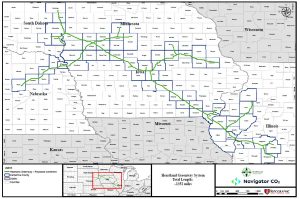Carbon pipeline operator nixes plans for one project, while another is on-hold
October 20th, 2023 by Ric Hanson
(RADIO IOWA [updated]) – Developers of the Heartland Greenway carbon pipeline have cancelled the project. The Navigator C-O-2 pipeline was one of three projects proposed to ship carbon from ethanol plants to underground storage. Navigator’s 810 mile route through Iowa would have sent the liquid carbon to storage in central Illinois. Last month, South Dakota regulators denied the company’s pipeline route application for that state. Last week, Navigator asked the Iowa Utilities Board to put its Iowa application on hold.
Navigator’s C-E-O says as good stewards of capital and responsible managers of people, the company has made the difficult decision to cancel the project.
The Iowa Utility Board’s hearing on the application from a different developer — Summit Carbon Solutions — is scheduled to resume next month. Summit executives recently pushed back the estimated start date for moving carbon through their pipeline by more than a year after permit setbacks in both North and South Dakota.
Monte Shaw of the Iowa Renewable Fuels Association says Navigator’s decision was not a surprise after some of its permit applications were pulled, but Shaw says it doesn’t change the reality for the ethanol industry. “I know there are listeners out there that probably think lowering your carbon footprint is a good idea. I know you have listeners that will think that’s just silly and some made up government program,'” Shaw says. “The bottom line is our customers are saying: ‘We want lower carbon biofuels.’ Our ethanol plants have to respond to that if they’re going to stay in business. The number one thing we can do to lower our carbon footprint is carbon sequestration.”
Shaw says the Iowa Renewable Fuels Association respects Navigator’s decision and continues to support other pipeline projects. “We think that carbon capture and sequestration is absolutely vital to the future of ethanol and corn growers’ prosperity and all of that,” Shaw says. “There are other projects out there and we’re going to continue to work with them and, ultimately, I do think we will be successful.” Shaw expects some of the ethanol producers that had signed agreements with Navigator to seek another partner to capture carbon and ship it out of their plants.
“I think the two largest ethanol producers in the United States were part of (Navigator’s) system in Poet and Valero. They’re not going to sit idly by. Now I can’t tell you what they will do, which system they may go to, maybe they look at another option that I haven’t even heard of,” Shaw says, “but I would be shocked if they weren’t looking at other options.” Andrew Johnson is one of the landowners who opposed Navigator’s project. Johnson says the pipeline would have run through his Lee County farm.”We have about 200 acres of row crop and timber area right outside of West Point,” he says. “It would have cut diagonally through all 200 acres.” Johnson says he’ll never again take his property rights for granted.
“We never had an opportunity to discuss with Navigator as far as plotting where it should go. They basically just said: ‘This is where it’s going to go and if you don’t like it, we’ll use eminent domain as a resource to obtain your property,'” Johnson said. “…I didn’t realize that there was an opportunity where a company could come into this state and literally take my land away…I thought it was ours and we bought it and that was the end of it, but we’re going to be relentless in our pursuit to change laws in legislation so this will never happen again. It should never have happened to begin with.”
Matthew Ung — chairman of the Woodbury County Board of Supervisors — says he’s heard from landowners in his northwest Iowa county who were concerned that Navigator would improperly seek eminent domain authority to seize their land for the pipeline. “These are fundamentally private projects that I think everyone exept the governor’s office seems to realize are not real public utilities and so that’s why there’s been such opposition,” Ung says. “It’s not necessarily on the means or the fact that it’s being done, just the fact that it’s being portrayed as something that it’s not.”
Ung, who is a Republican, has been a Woodbury County Supervisor for nearly nine years.






